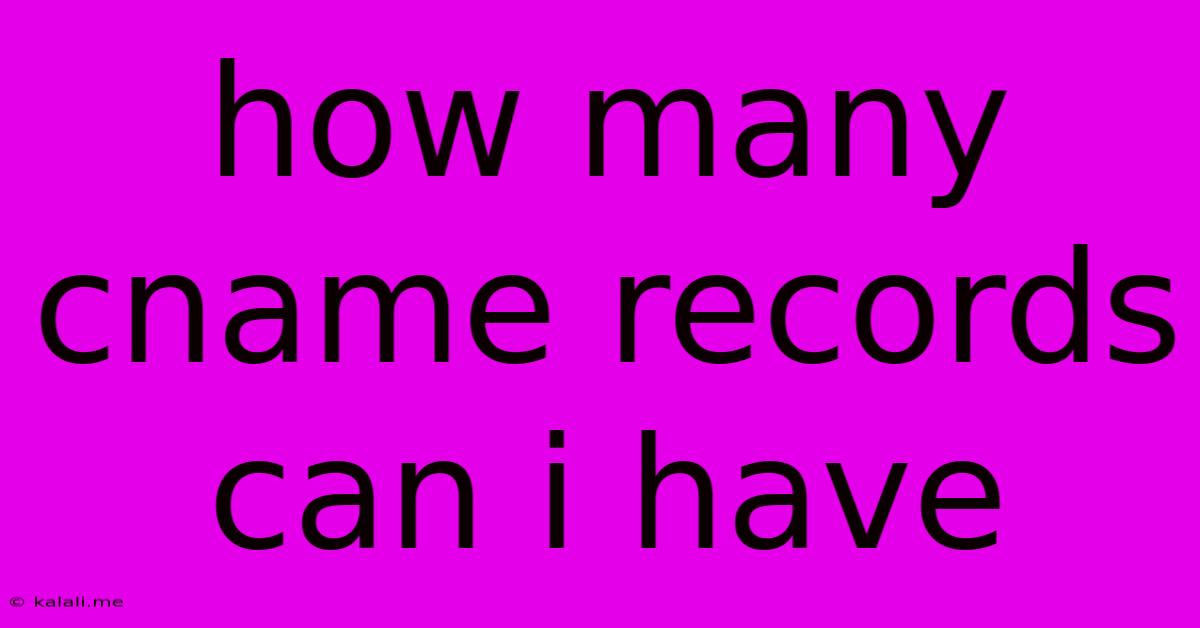How Many Cname Records Can I Have
Kalali
Jun 02, 2025 · 3 min read

Table of Contents
How Many CNAME Records Can I Have? Understanding DNS Limits
The question of how many CNAME records you can have isn't a simple one with a single definitive answer. It depends on your specific DNS provider and the configuration of your domain. While there's no universal limit imposed by the DNS protocol itself, practical limitations exist due to how DNS servers are designed and managed. This article will delve into these limitations and offer best practices for managing your CNAME records effectively.
Understanding CNAME Records
Before discussing limits, let's quickly review what a CNAME record is. A CNAME (Canonical Name) record is a type of DNS record that maps an alias hostname to a canonical (primary) hostname. For example, www.example.com could be a CNAME record pointing to example.com. This simplifies management – if you change the IP address associated with example.com, all CNAME records pointing to it automatically update.
The Key Limitation: The Root Record
The primary limitation stems from the fact that you cannot have a CNAME record as the root (apex) domain. The root domain (e.g., example.com) typically requires an A record (IPv4 address) or AAAA record (IPv6 address) to directly point to the server's IP address. This is a fundamental rule of DNS. Attempting to create a CNAME record for your root domain will usually result in an error.
Practical Limits from DNS Providers
While the DNS protocol itself doesn't impose a hard limit on the number of CNAME records, your DNS provider likely does. These limits vary significantly. Some providers might have a limit of a few hundred CNAME records per zone, while others might offer more flexible, potentially unlimited, configurations. Check your specific DNS provider's documentation to determine their limitations. Factors such as your plan and the specific DNS server you're using might also affect the limits.
Best Practices for Managing CNAME Records
Even if your provider allows a large number of CNAME records, it's best to avoid excessive use. Too many CNAME records can:
- Impact Performance: Resolving multiple CNAME chains can add latency to DNS lookups, potentially affecting website loading times.
- Increase Complexity: Managing a large number of CNAME records can become complicated and error-prone.
- Create Potential Conflicts: While less common, improperly configured CNAME records can create conflicts within your DNS zone.
Alternatives to Excessive CNAME Records:
- ALLOCATION of Multiple Subdomains: Instead of many CNAME records pointing to different services, consider allocating multiple subdomains (e.g.,
blog.example.com,api.example.com) and managing A or AAAA records for each directly. This simplifies DNS resolution. - Using ALIAS Records (if available): Some DNS providers offer "ALIAS" records which behave similarly to CNAME records but can be used at the root domain. Check your provider's documentation to see if this is an option.
In Conclusion
There's no universal answer to "how many CNAME records can I have?". The limit is dictated by your DNS provider and the fundamental rule against CNAME records at the root domain. Prioritize clarity and efficiency in your DNS setup. Instead of aiming for a high number of CNAME records, focus on using them strategically to simplify your domain management and avoid negatively impacting website performance. Remember to consult your DNS provider's documentation for specific limits and recommendations.
Latest Posts
Latest Posts
-
Bible Verse Peter Walking On Water
Jun 03, 2025
-
Ceiling Fan And Light Wiring Diagram
Jun 03, 2025
-
Can You Connect Switch Controller To Pc
Jun 03, 2025
-
How To Get Pee Smell Out Of Wood
Jun 03, 2025
-
Do You Need Volunteer Hours For A Job At 15
Jun 03, 2025
Related Post
Thank you for visiting our website which covers about How Many Cname Records Can I Have . We hope the information provided has been useful to you. Feel free to contact us if you have any questions or need further assistance. See you next time and don't miss to bookmark.